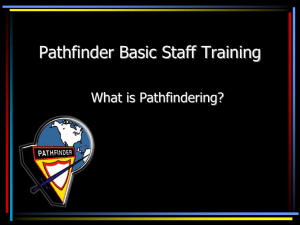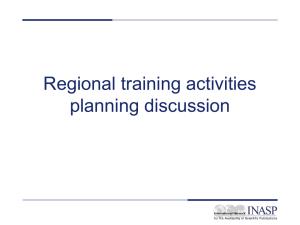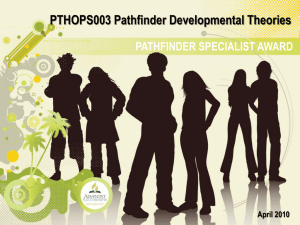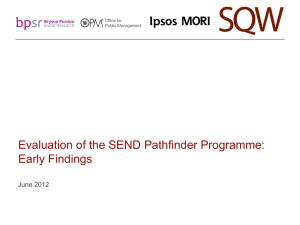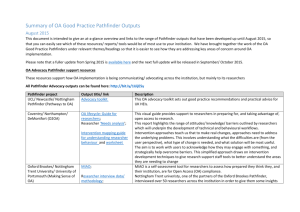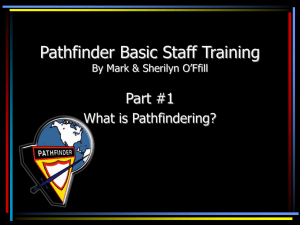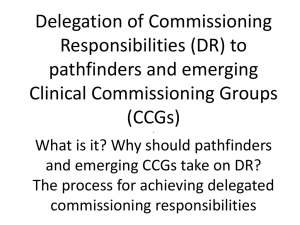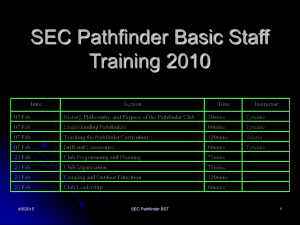- Pathfinders South Pacific - Seventh
advertisement
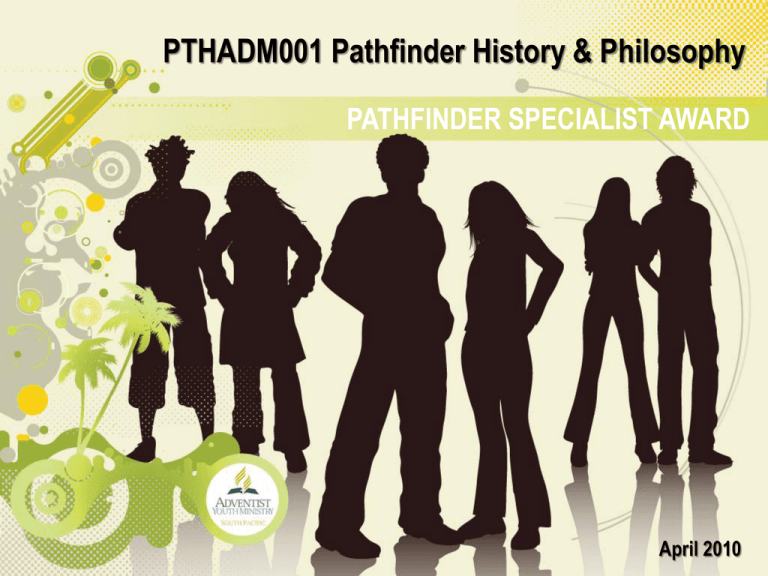
PTHADM001 Pathfinder History & Philosophy PATHFINDER SPECIALIST AWARD April 2010 A BRIEF HISTORY OF PATHFINDERING • Through generations, the church has taken on the responsibility of sharing Jesus with our children. • Children’s Ministry finds it roots in the Sunday School Movement. • In 1879 Luther Warren (17) and Harry Fenner (14) began the first Youth Society in their local church. • In 1901 the General Conference took the first steps in approving the forming of Youth Societies which were under the umbrella of the Sabbath School Department, lead by Mrs Flora Plummer. A BRIEF HISTORY OF PATHFINDERING • In 1907, at a General Conference session, an action was taken to formerly establish a youth ministry, known as the Young People’s Department. • In 1909, the Junior Missionary Volunteer (JMV) movement was born. • Around the same time, The Scout Movement was beginning to take shape and was initiated by Baden Powell, who saw a need to train and equip young men with life skills. • He tested his scouting concepts by taking a group of 20 boys to Brownsea Island in August 1907. A BRIEF HISTORY OF PATHFINDERING • Adventist leaders explored the idea of having Adventist Scout-like clubs. • Arthur W. Spalding, an early church leader, developed Mission Scouts, exclusively for boys, in 1919 and introduced the idea of a Pathfinder Pledge and Law. • In 1922 the church formally developed classes for JMVs that operated in SDA schools. • In 1929 a Pathfinder club was developed for boys and girls which included JMV classes and also crafts and other activities…however… A BRIEF HISTORY OF PATHFINDERING • Local leaders were not in favour of the activity-component and felt it reflected ‘bringing the world into the church’ hence the name “Pathfinder Club” was dropped. • Committed leaders kept the vision. • In 1946, John Hancock, Youth Director of the South Eastern California Conference began the first Pathfinder Club in his home church in Riverside, California – this conference had already accepted the name “Pathfinder Club”. PATHFINDERING IN THE SOUTH PACIFIC • In 1953 the first Pathfinder Club was formed in the South Pacific by Pr Kevin Silva at the Preston Church in Victoria, Australia. • The first Camporee was held at Dorrigo in New South Wales, Australia and was run by the Trans-Tasman Union Conference. • In 1979 the name Missionary Volunteers (MV) was changed to Adventist Youth (AY) and Junior Missionary Volunteers (JMV) eventually became Adventist Junior Youth (AJY). PATHFINDERING IN THE SOUTH PACIFIC • In 1982 the Pathfindering organization merged with AJY Societies to be known as Pathfinder AJYs. • Until that time AJYs was a Sabbath afternoon program and Pathfinders was outdoors out-of-Sabbath hours – AJYs being the harder of the two to operate. • The curriculum of Pathfinder AJYs was reworked and brought into line with the General Conference Pathfinder program; hence becoming a 6-year curriculum. THE FORMER PATHFINDER LEADERSHIP SCHEME Pathfinder Master Guide PLA No Pathfinder Experience APLA Basic • “Basic” was designed for those with no former Pathfindering experience. • PLA offered specialization in 2 of 7 skill areas (Admin. & HR, Camping, Recreation, Church & Community Service, Drill & Marching, Creativity, Outdoor Ed.). • APLA offered additional training for leaders in 1 of these areas. THE CURRENT PATHFINDER LEADERSHIP SCHEME Pathfinder Master Guide PLA PSA No Pathfinder Experience • In 2008 the Master Guide Course was upgraded to include Spiritual Development and Adventist Church Heritage. A change in insignia was also voted through. • In 2008 the PLA program was adopted as the minimum training requirement for pathfinder leadership. • In 2010 the Pathfinder Specialist Award was launched offering specialized training in the outdoors as well as a number of other areas. OTHER PATHFINDERING CURRICULAE SPECIALTY CURRICULUM • Launched in 1990 and designed by Arnold Turner, a District Director in NSW. • No change was made to the Junior Pathfinders, however the teens were offered a more specialised program to cater for their developmental needs. • A wide range of specialties offered included: Bushcraft, Campcraft, Communication & Personal Development,Drill & Marching, First Aid, Nature, Recreation, Wilderness Living, Arts & Crafts. OTHER PATHFINDERING CURRICULAE WAY TO GO CURRICULUM • Released in 2001 in the Australian Union Conference and New Zealand. • An activity-based learning program. • Centered on faith development principles. • A revised version consisting of 400 pursuits went into circulation in 2003. THE VALUE OF PATHFINDERING • Jesus demonstrated the importance of ministering to children when He was on earth. “Let these little children come to Me. Don’t stop them! For the Kingdom of Heaven belongs to such as these” Mt 19:14. • There are numerous references in the Bible regarding teaching and training children when they are young. THE PHILOSOPHY OF PATHFINDERING • The Seventh-day Adventist Church is committed to understanding young people and training them for leadership and service to humanity. • Pathfindering is a church-centred spiritual-recreational program. • Pathfindering provides opportunities for the development of new attitudes and skills that produce personal grown, team or community spirit and a sense of loyalty and respect for God, His creation and His church. • Pathfindering is designed on the premise that children learn best by example. WAYS TO FULFIL THE PHILOSOPHY OF PATHFINDERING • Help Pathfinders understand that God loves them, cares for them and appreciates them. • Encourage Pathfinders to discover their own God-given potential. • Inspire Pathfinders to give personal expressions of their love for God. • Make the number one priority of the club program the personal salvation of each Pathfinder. WAYS TO FULFIL THE PHILOSOPHY OF PATHFINDERING • Build a healthy appreciation and love for God’s creation into a Pathfinder’s life. • Teach Pathfinders specific skills and hobbies that will make their lives more meaningful and will occupy their time with profitable accomplishments. • Encourage Pathfinders to keep physically fit. • Give opportunity to develop and enlist leadership. •Seek to foster the harmonious development of the physical, social, intellectual and spiritual life of each Pathfinder.

